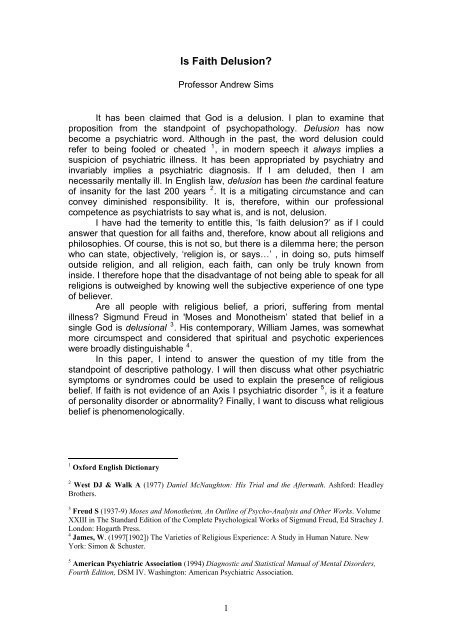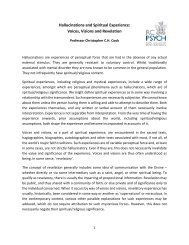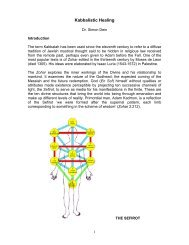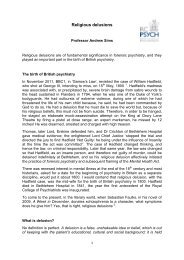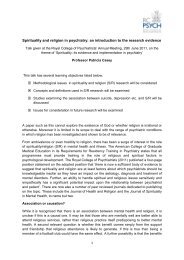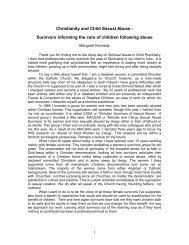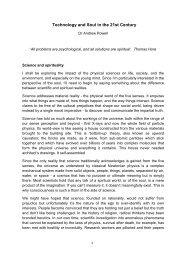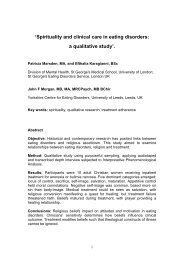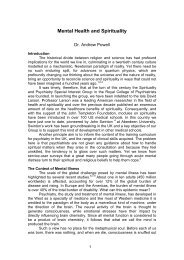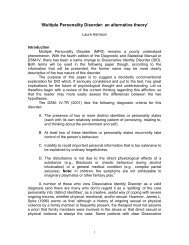Is Faith Delusion Andrew Sims EDITEDx
Is Faith Delusion Andrew Sims EDITEDx
Is Faith Delusion Andrew Sims EDITEDx
You also want an ePaper? Increase the reach of your titles
YUMPU automatically turns print PDFs into web optimized ePapers that Google loves.
Concrete thinkingThose with religious beliefs accept that some of their expressions arespiritual and not to be acted on literally, for example, ‘giving your heart to theLord Jesus’. In some serious mental illnesses there are abnormal processesof thinking resulting in a literalness of expression and understanding.Abstractions and symbols are interpreted superficially without tact, finesse orany awareness of nuance: the patient is unable to free himself from what thewords literally mean, excluding the more abstract ideas that are alsoconveyed. This abnormality is described as concrete thinking and delusionsare concrete. I have known of patients who interpreted literally, that isconcretely, the scriptural injunction, ‘if your eye … your hand…offend…cut itoff.’ Concreteness is useful in making the psychopathological distinctionbetween the disturbed thinking of the patient with schizophrenia and thedescription of internal experience of a person with strong religious beliefs 14 .Summarizing delusion<strong>Is</strong> faith a delusion? Although, not infrequently, the content of delusionsis religious, faith, of itself, is not a delusion. This is true even for minority andsocially disapproved beliefs. For some cults, abnormal psychologicalprocesses may be frequent but these are not delusions for the followingreasons:1. They do not fulfil the criteria for definition of delusion - it is not ‘out ofkeeping with the patient’s cultural and social background’.2. They are not held on demonstrably delusional grounds.3. Religious beliefs are spiritual, abstract, not concrete – ‘God within me’is not experienced as a tactile sensation.4. Religious beliefs are held with insight - it is understood that others maynot share their beliefs.5. For religious people, bizarre thoughts and actions do not occur in otherareas of life, not connected with religion.6. Religious ideas and predominant thinking is a description of content.Religious delusions occur in a person whose predominant thinking isreligious. <strong>Faith</strong> is part of their personhood; delusion arises frompsychiatric disorder. A person with religious belief may have a delusionbut only if they have a concurrent psychiatric illness.Can other psychiatric symptoms explain the presence of religiousbelief?If religious faith is not delusional, is it, per se, a manifestation of anyother psychiatric symptom or syndrome? The following are contenders for thathonour:1. Shared or communicated delusion2. Overvalued idea3. Culturally held shared belief14 <strong>Sims</strong> A (2003) Symptoms in the Mind: An Introduction to Descriptive Psychopathology.3 rd Edition,Edinburgh: Saunders.4
4. Paranoid idea of reference5. Abnormal mood state - Anxiety disorderAffective disorder – depression or elationDepersonalisation6. Pathological perception - Hallucination – ‘hearing’ the voice of God.7. Disorder of volition – locus of control.Shared and communicated delusionThis condition is designated in the International Classification induceddelusional disorder 15 . This occurs when a delusion is shared by two or morepeople; it used to be called folie à deux, à trois etc. It is not similar to religiousbelief. In a case report describing folie à quatre, the patient who was initiallyseen believed that a large industrial concern had put ‘bugging’ devices in thewalls of his brother’s house 16 . He claimed that employees of the firm hadbeen following him everywhere and interfering with his own house. His wife,the protagonist who showed ‘communicated delusion’, believed this storyinitially and produced supposedly corroborative evidence. A year later,following his in-patient treatment, she no longer accepted the plot andbelieved her husband to be mentally ill. She was a very anxious person.When the patient’s brother was visited at home, it was found that he, and thesister who lived with him, both believed in the plot and were both currentlyreceiving treatment for a schizophrenic illness.Overvalued ideaThis is a solitary, abnormal belief that is neither delusional norobsessional in nature, but which is preoccupying to the extent of dominatingthe sufferer’s life 17 . It is usually associated with abnormal personality. Ahighly abnormal religious belief could sometimes be regarded as anovervalued idea. For example, an individual repeatedly desecrated churchesbecause he believed they displayed images of which he disapproved.Culturally held shared beliefIt was difficult to recruit nurses to work in the psychiatric hospital inLusaka, Zambia because most trainee nurses shared the belief that you can‘catch’ mental illness from the patients. Clearly, beliefs shared by members ofa religious minority would also fit into this category. However, DSM IV statesthat a delusion ‘is not an article of religious faith.’ 18Paranoid idea of self-referenceA doctor from the middle-east belonged to a small, persecutedChristian group. He came, after being tortured at home, as a refugee to15 World Health Organization (1992) The ICD-10 Classification of Mental and BehaviouralDisorders, page 104. Geneva: World Health Organization.16 <strong>Sims</strong> ACP, Salmons PH & Humphreys P (1977) Folie à quatre. British Journal of Psychiatry 130:134-8.17 McKenna PJ (1984) Disorders with overvalued ideas. British Journal of Psychiatry 145, 579–85.18 American Psychiatric Association (1994) Diagnostic and Statistical Manual of Mental Disorders,4th Edn, page 765. Washington DC: American Psychiatric Association.5
Britain. He learnt English and re-qualified. He said that one of his teachershad described himself as ‘anti-Christ’ and, on another occasion he thoughtthat a Jehovah ’s Witness who visited him at home must be involved in a plotagainst him personally because he spoke Arabic. The Occupational HealthPhysician wondered if he was fit to practice and asked a psychiatrist toexamine him. His ideas were not delusional, but, because of his previousexperiences, he interpreted many harmless circumstances as threats directedat him personally.Abnormal mood stateThis might include anxiety disorders, affective disorders – eitherdepression or elation and depersonalisation. Does religious faith cause, forexample, anxiety, depression, mania, and so on? This topic would meritfurther discussion, but, in brief, this is where we might apply the distinctionbetween form and content. A keen member of an active church who met withother church members 3 or 4 times a week became depressed; she hadprominent religious notions in her depressive symptomatology. A young monkwho became manic said that God had given him special powers to know whatpeople were really thinking. Religion has not caused depression or mania, butwhen the mental illness has occurred, the content has been religious innature. In general, those with religious faith have a better outcome frompsychiatric disorder19 . It has been claimed, although not based onepidemiological studies, that there are negative effects of religion ondepression when there is emphasis on original sin 20 .Pathological perceptionThis has been excellently covered by Dein 21 . We have to thankProfessor Romme for reminding us that hearing voices does not necessarilyimply mental illness, and certainly not schizophrenia 22 . The Old Testamentprophets, St Paul and many people today speak of ‘hearing the voice of God’.Are all these describing hallucination: perception without an object? 23 No, thisvoice is not experienced as something outside self, neither as a sensation thatanother person might hear. Quite often it has an ‘as if’ quality. The subjectdescribes it as spiritual, abstract and not concrete, physical.Disorder of volition – loss of controlHas the person with religious belief lost his capacity for independentaction, believing himself to be completely controlled by God from above, like apuppet on a string? There is evidence that those with religious belief are more19 Koenig HG, McCullough ME & Larson DB (2001) Handbook of Religion and Health. OxfordUniversity Press.20 Branden N (1994) The Six Pillars of Self-Esteem. New York: Bantam.21 Dein S (2008) Hearing the voice of God. Newsletter of the Spirituality and Psychiatry SpecialInterest Group.22 Romme M & Escher S23 Esquirol JED (1817) Hallucinations, reprinted in Des Maladies mentales 1938. Paris: Baillière.6
likely to experience internal locus of control, and this is associated with betterfunctioning 24 .What I have described are unusual mental states, and some of themare pathological. All of them can be associated with religious belief, but that isnot the same as claiming that religion, per se, is or causes psychiatricdisorder. <strong>Faith</strong> is not delusional, neither does it cause, of itself, any otherpsychiatric condition or symptom. I have reviewed just these sevenphenomena: shared or communicated delusion, overvalued idea, culturallyheld shared belief, paranoid idea of reference, abnormal mood state ofanxiety, depression, elation or depersonalisation, pathological perception, anddisorder of volition. We have seen how each of these can be associated withreligious belief and practice in a person for whom faith is important. We havenot found any causal link between religion and psychopathology.Personality abnormality and disorderIf we make the distinction in DSM IV between Clinical Disorders (Axis I)and personality disorder (Axis II), as faith is not a clinical disorder, is it afeature of personality disorder? If religious belief is not a symptom of formalpsychiatric disorder, is it evidence of disturbed personality? Somepsychiatrists in the past would imply that this was so, for example, Mayer-Gross, Slater, and Roth in the 1960s stated that religion is for ‘the hesitant,the guilt-ridden, the excessively timid, those lacking clear convictions withwhich to face life’ 25 .In fact, the situation is very similar to that applying to mental illness andreligion: the manifestation and expression of religious belief, even thereligious group to which one has allegiance, is substantially affected bypersonality structure but the belief itself, or even this individual holding thatbelief, is not caused by, or a feature of, personality abnormality or disorder.The beliefs themselves, and that an individual should have religiousbelief, is not caused by personality factors. However, the manifestation ofbelief, the subjective experience of faith and the particular regime of practiceis very much influenced by the personality. Martinez, a Spanish psychiatrist,has elaborated on this, using Jungian personality typology, for prayer 26 . ‘Oneof the most beautiful things we find in God’s creation is variety. The mainreason for understanding the way we are, our temperament and personality,is not to make us feel better but to make real improvements in ourrelationships, both with God and with our brothers and sisters.’It would be worth devoting a whole conference to personality and itsdisorders. These six questions could profitably be discussed:24 Jackson LE & Coursey RD (1988) The relationship of God control and internal locus of control tointrinsic religious motivation, coping and purpose in life. Journal for the Scientific Study of Religion27, 399-410.25 Mayer-Gross W, Slater E & Roth M (1954, 1960 & 1969) Clinical Psychiatry. 1 st , 2 nd and 3 rdEditions. London: Baillière, Tindall & Cassell.26 Martinez P (2001) Prayer Life: How Your Personality Affects the Way You Pray, pages 3- 30,Milton Keynes: Spring Harvest Publishing.7
1. Why do some people find spiritual life and the whole of life, so difficultwhilst others appear to cruise through, finding everything easy?2. <strong>Is</strong> not the distribution of personality, and other innate endowments,unfair?3. Definitions of personality include such words as persistent, longstanding.How can we have a model for personality that allows forchange?4. If what we do is determined by our constitution, an innate tendency,why do we hold people responsible for antisocial behaviour?5. How should we classify persistent moral badness – is it a psychiatriccondition?6. <strong>Is</strong> there an essential discontinuity between those with personalitydisorder and those with ‘normal personality’?Unfortunately, this intriguing subject has to be abandoned. Individualpersonality, abnormality of personality and personality disorder are clearlyrelevant for spiritual experience but the relationship is complex. It is helpful tobe aware of personality characteristics for religious believers and those theycome into contact with. It will affect many aspects of their religious belief andpractice. It would be a nonsense, however, to stand this important statementon its head and claim that religious belief is ‘nothing but’ the expression of adisordered personality.We have considered whether faith is a psychiatric symptom orevidence of disturbed personality and concluded that it is not. In fact, theepidemiological evidence is that there is an association between religiousbelief and practice and good or better mental health. The massive Handbookof Religion and Health, by Koenig et al., surveys 1200 studies and 400reviews and concludes: ‘In the majority of studies, religious involvement iscorrelated with well-being, happiness and life satisfaction; hope and optimism;purpose and meaning in life; higher self-esteem; better adaptation tobereavement; greater social support and less loneliness; lower rates ofdepression and faster recovery from depression; lower rates of suicide andfewer positive attitudes towards suicide; less anxiety; less psychosis andfewer psychotic tendencies; lower rates of alcohol and drug use and abuse;less delinquency and criminal activity; greater marital stability and satisfaction27 .What is faith phenomenologically?I have here set myself a question I cannot possibly answer! <strong>Faith</strong> is notpsychopathological; there is no evidence of mental illness affecting allbelievers. What is the nature of the subjective experience? Obviously, it isvery different for different people at different times.I am going to look at this with the tunnel vision of the psychiatrist andthe blinkers of the descriptive psychopathologist. I shall not consider at all therich vein of mystical, artistic and theological writing on the subject. We will,very prosaically, only consider cognitive, affective and volitional aspects. Theword belief is, of course, cognitive. The religious cognitions of many believers27 Koenig HG, McCullough ME & Larson DB (2001) Handbook of Religion and Health. OxfordUniversity Press.8
have often been summarized in creedal statements: ‘I believe in God…’ Thisis fine for establishing uniformity, but, in practice, each person will interpretthe unadorned words in their own individual way. They will also, withoutthinking further, associate the solely cognitive side with affective and volitionalaspects: ‘My belief in God gives me a feeling of belonging’; ‘Belief in Godaffects what I do, it gives me a code of behaviour’.Each aspect has implications for self experience and relationships.Saying to myself, inside my mind, the phrase ‘I believe in God’ establishesand defines what I know about myself in terms of the five formalcharacteristics of self according to Jaspers 28 and Scharfetter 29 :1 The feeling of awareness of being or existing, ‘I know that I exist’.2 The feeling of awareness of activity. ‘When I move my arm, I am aware ofmyself’.3 An awareness of unity. ‘I know that I am one person’.4 Awareness of identity. There is continuity; ‘I have been the same personall the time’.5 Awareness of the boundaries of self. I can distinguish what is myself fromthe outside world, and all that is not the self 30 .There is also a bearing on relationships: obviously the relationship withGod, but also relationships with all other individuals. Psychiatry teaches usthat people, patients, cannot be considered as if living in a vacuum, one musttake the social milieu, in its widest sense, into account.Arising from the limitations of a highly reductionist psychiatry is thetendency to ‘boil down’ affect into a few very simple descriptions: depression,hyperactivity, anxiety, guilt feelings, and so on. The real world is much morecomplex, both in range and in the combination of different, sometimesconflicting, emotions. For the religious believer there is a massive and veryvaried affective element associated with the experience of faith. This does notmean that religious belief ‘is just emotion’, or that believers cannot exercisetheir minds and examine the evidence. The affective aspect of faith also has arelational side; belief implies involvement with God and with others.Religious belief is volitional – an act of will, and willing actions.Cognitive acceptance of creedal premises with the affective assumption offaith leads to individual actions and a code of behaviour consonant with thosebeliefs. Morality is necessarily linked to activity.However, as always, volition is not straightforward. The conflict withinthe self is variously described but universally recognised. St Paul put it: ‘I donot understand what I do. For what I want to do I do not do, but what I hate I28 Jaspers K (1959) General Psychopathology (transl. Hoenig J & Hamilton MW from the German 7thEdn. 1963). Manchester: Manchester University Press.29 Scharfetter C (1981) Ego-psychopathology: the concept and its empirical evaluation. PsychologicalMedicine 11, 273–80.30 <strong>Sims</strong> A (2003) Symptoms in the Mind, 3 rd Edition, Edinburgh: Saunders.9
do.’ 31 St Augustine, whilst agreeing with Paul, stressed the nature of thedivided will rather than the divided self. Cook has examined the dilemma ofthe will for alcohol abuse and addiction, but this is applicable for other areasof relevance for the psychiatrist 32 . He describes the different models thathave been used to explain alcohol abuse: some propose the alcoholic as thevictim of his environment or his genes; some have him as the weak-willedagent of his own catastrophe. Cook points out the need for a second ordervolition: ‘to want not to want to drink’. He stresses that the internal conflict isserious, with dire consequences, and that addicts need more than just theirown will power. Relief from the lethal habit requires grace, and grace comesfrom the act of not rejecting it. This, if you like, is a theological model foralcohol abuse, that can be extended more generally to problems of volition, allof which have a moral element, and how to deal with them practically.ConclusionI started with the question, is faith delusion? I spent some time lookingat precisely what delusion is in psychopathology and then measuring religiousfaith against it. I concluded that faith, of itself, is not and cannot be delusion,although people frequently have delusions that include religious and spiritualcontent. I covered briefly various other abnormal phenomenological statesand found that, although those with religious belief may well experience them,faith was not causative. I also looked at the nature of personality to assesswhether faith could be construed as a product of abnormal personality.Although variations of personality affect the manifestation and self-experienceof belief, religious faith exists independent of personality. Finally, I examinedthe phenomenon of faith, observing its cognitive, affective and volitionalaspects. This process has been carried out from the perspective of descriptivepsychopathology.© <strong>Andrew</strong> <strong>Sims</strong> 2007This paper is taken from a book, with this title, by the author, to be publishedby Continuum in 2008.31 Romans 7:15 The Holy Bible, New International Version, London: Hodder & Stoughton.32 Cook CCH (2006) Alcohol, Addiction and Christian Ethics. Cambridge University Press.10


